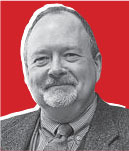On the need to narrow the focus of today’s church leaders
Mike is the pastor of a typical Canadian church. His staff team includes an office administrator, youth worker and associate pastor. In a smaller church the team might be part-timers, in a bigger church full-timers. Whatever the church size, what should be the key parts of Mike’s job?
Mike would work with the staff and the senior lay leaders to oversee the church – to manage its current life and plan its future. He’d pastor these pastoral leaders, helping each one to grow spiritually and helping them all function well together.
Mike would also serve as the church’s main representative to the community. In consultation with the other leaders and in keeping with their strategic vision for the church, Mike would attend certain functions and participate in select groups to foster goodwill toward the church and help the church partner with other local institutions in serving their constituents.
However, this typical pastor (and in many churches it might be Michelle instead of Mike) would spend a lot of time reading books and articles and listening to podcasts. Constant study, normally every day.
That means turning off cell phones and emails, retreating into a designated space for prayerful focus, and continuing a lifelong curriculum of Scripture, church history, theology, ethics and whatever subjects most need addressing in this specific church – perhaps other religions, sociological study of the local community or contemporary moral issues.
Mike or Michelle would then prepare and deliver sermons, "in-service" lessons for pastoral leaders and community seminars.
These are the three tasks only a pastor can do. Yes, other people in the church can do each of these to some extent, and we laypeople should do what we can, of course, to contribute to our church’s life and mission.
It is the unusual lay leader, however, who has even a basic theological education. And the most obvious needs of Canadian Christians today that can be addressed most helpfully by pastors are these – education and exhortation.
Let’s be clear that the Christian life is about far more than correct ideas. Centrally, in fact, Christianity is a relationship with God in Jesus Christ enabled by the Holy Spirit. Prayer, devotional reading of the Bible, worship, sanctification, healthy relationships – all of these are at the core of the Christian faith, as they are emphasized throughout the New Testament.
Every Christian, however, has spiritual gifting to help others grow in one or another of these various respects. What a pastor especially needs to do is what a pastor alone is properly equipped to do. Mike/Michelle has the personal gifts, theological training and support of the church that provides time, space and an audience of learners in order to understand God’s Word, to discern how God wants us to respond to our particular situation, to teach that to us and to direct us to intelligent and effective faithfulness.
In short, while having right ideas isn’t everything, having wrong ideas about what’s going on and what we should make of it will lead to mistakes everywhere in our lives. Only someone with the right talent, training and time can help us think as we should so we will live as we should.
"The question of deciding what constitutes reality," as The Atlantic put it recently, needs a good answer – a true answer expressed plainly and accurately in contrast to the most attractive alternatives. Few of us – maybe none of us except our pastor – can provide that.
So we had better do all we can to help Mike or Michelle do that job well. We must free our lead pastors from committees, social obligations, counseling commitments and everything else they don’t absolutely have to do. The task of reading the signs of the times for our particular congregation according to the complex teaching of Scripture in light of the church’s rich heritage and employing the best available conceptual tools is a hard one. It’s a crucial one. And only pastors are equipped and positioned to do it.
Canadian pastors today can’t be everything we have asked them to be. Above all, we need them to be danger-spotters, truth-tellers, problem-solvers, and way-finders through an increasingly chaotic cultural landscape.
Most pastors will gladly do this difficult, vital work if we let them. Will we?

John Stackhouse teaches at Crandall University in Moncton, N.B. Find more of these columns at www.FaithToday.ca/ChristAndCulture.